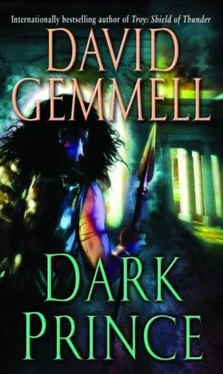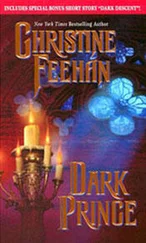But never in his long life had such a light blazed around him and it left him confused, uncertain. He lay still, lifting his grizzled head to sniff the air. Here was something he knew — and feared. The scent of Man.
And close by.
The wolf did not move. The scent was from his left and he slowly turned his head, yellow eyes watching for movement.
A man was lying on a slab of marble, his naked skin pale in the moonlight. He groaned and moved. Only moments before, the wolf had leapt to that same slab to look out over the flock, selecting his victim. There had been no scent of Man then. Yet there he was, stretched out.
The wolf had survived his many years by knowing when to be cautious and when to be brave. Men who appeared from the air, amid bright unnatural light, did not inspire courage in the old beast. And though he was hungry he slunk away towards the northern woods, far from the scent of Man.
* * *
Helm stirred. The stone was cold and uncomfortable on his back and he groaned as he woke, rolling to his side and swinging his powerful legs over the side of the slab. Sitting up, he yawned and stretched. The night was cool, but not unpleasant, and he saw a wolf loping away down the hillside towards the trees. Helm's hand reached for his sword, and it was then he realized he was naked and unarmed.
'Where is this place?' he said aloud. 'How did I come here?'
In those first few moments Helm was not concerned. He was a warrior — strong, tested in the heat of many battles, confident in his power. But as he searched his memories, fear akin to panic flared within him. He did not know how he had come to this strange place, but worse than this — so much worse — he realized with a shock which sent his heart hammering wildly that the corridors of his memory were silent and deserted.
'Who am I?' he whispered.
Helm. I am Helm.
'Who is Helm?' The name was small comfort, for with it came no memories of times past. Looking down at his hands, he saw they were broad and calloused, the fingers short and powerful. His forearms showed many scars, some jagged, others straight cuts. Yet how he had come by them was a mystery.
Be calm, he warned himself. Look around this place. It was then that he realized he lay within a graveyard, full of silent statues and marble tombs. Quelling his panic, he leapt lightly from the slab and explored. Some of the tombstones had cracked and fallen, others were overgrown with weeds. No one tended this place then, he thought. A cool wind hissed over the stones and he shivered. Where are my clothes, he wondered? Surely I have not walked across the land naked like a field slave? A gleam of light came from his left. For a moment only he thought a warrior stood there, moonlight gleaming from a full-faced helm of bronze and a gilded breastplate. He tensed, his hands curling into fists; then he saw that there was no silent soldier, only a suit of armour placed on a wooden frame.
He approached it warily, eyes scanning the graveyard around it.
The helm was beautifully crafted, save that it had no plume or crest. The skull was clear, showing no sign of the armourer's hammer, nor a single rivet. The face-guard had been shaped into the features of a man, bearded and stern of eye, with high curved brows and a mouth set in a terrible smile. The breastplate was also of superb design, the shoulders padded with bronze-reinforced leather, the chest fashioned in the shape of a strong man's musculature, curving pectorals and well-developed muscles at the solar plexus. Beneath it was a kilt of leather strips edged with bronze, and below that a pair of doeskin riding boots.
Beside them lay a scabbarded sword. Helm reached down and drew the weapon. His heartbeat slowed, confidence returning. The blade was of polished iron, double-edged and keen, the balance perfect.
The armour is mine, he realized. It has to be.
Swiftly he dressed. The breastplate was a perfect fit, as were the boots. The kilt sat well on his waist, the sword scabbard sliding easily into a loop of bronze at his left hip. Lastly he lifted the helm, easing it down over his short-cropped hair. As it settled into place a searing pain flowed over his features, burning like fire. He screamed and tried to pull the helm loose, but molten metal ate into his skin, pouring into his nostrils and mouth and anchoring itself to the bones of his face.
The pain passed.
Opening his eyes he saw that he had fallen to his knees. He rose and tried once more to remove the helm, but it would not budge. The breeze whispered across the graveyard — and he felt it upon his face, even as he had felt his hands when they tried to remove the helm. Lifting his right hand, he touched the metal mouth. It was cold, yet yielding. His finger probed further, touching his tongue; this too was metallic and yet still soft.
His face was now bronze; the helm was more than joined to his skin, it had become part of him.
'What is happening to me?' he bellowed, his own voice strange in his ears.
'Nothing is happening,' replied a soft voice. 'You are merely preparing yourself for the task ahead.'
Helm swung, his sword flashing into his hand. But there was no one in sight. 'Where are you?'
'Close by,' came the voice. 'Do not be alarmed, I am a friend.'
'Show yourself, friend .'
'That is not necessary. You are in the hills of Arcadia. Your quest lies to the north, at the Gulf of Korinthos.'
'I am not your slave!' stormed the warrior.
'You do not know what you are, all you know is the name I gave you.' The voice pointed out, the tone equable, even friendly. 'But all your answers lie ahead. You must seek out the Golden Child.'
'And if I don't?'
There was no reply. 'Are you still there? Speak to me, curse you!'
But the graveyard was silent.
* * *
Attalus sat back, resting his shoulders against a boulder and surveying his companions. Brontes was sitting opposite, his great brown eyes staring into the fire. Beside him the lion-headed Arges was stretched out, his maned head resting on his hugely muscled arm, his tawny eyes watching Attalus. The cyclops, Steropes, was asleep, breath hissing through his fangs. Attalus transferred his gaze to the cliff path where a single centaur watched for signs of the Makedones. Beside him Alexander stirred, moaning in his sleep. Attalus glanced back at Arges; still the creature watched him.
'Do you have to lie there and stare?' Attalus asked. The lion's mouth opened, a low growl issuing forth.
Brontes looked up from the fire. 'He does not like you,' he said.
‘I’ll lose no sleep over that,' retorted Attalus.
'From where does your anger come, Human?' queried Brontes. 'I feel it in you — a bitterness, a frustration perhaps?'
'Leave me in peace,' snapped Attalus. 'And make sure your hairy brother keeps his distance, or he's likely to wake up with a length of Macedonian steel in his heart.' And he stretched out on the ground, turning his back on the brothers.
Bitterness? Oh yes, Attalus knew where the seeds had been planted for that. It had been on the day when his father killed his mother. The death had not been easy and the boy had listened to her screams for hours. He had been young then, merely twelve, but after that day he had never been young again. At fourteen he had crept into his father's bedchamber with a razor-sharp skinning knife, running the blade expertly across the man's throat and standing back to watch the sleeping man wake with blood bubbling into his lungs. Oh, he had thrashed his arms, struggling to rise, his fingers scrabbling at his throat as if to bind the slashed arteries. Bitterness? What could these creatures know of his bitterness?
Unable to sleep, Attalus rose and walked from the camp. The moon was high, the night breeze chill. He shivered and glanced up at the cliff path. The centaur was nowhere in sight. Uneasy now the swordsman scanned the high rocks, seeking any sign of movement.
Читать дальше












